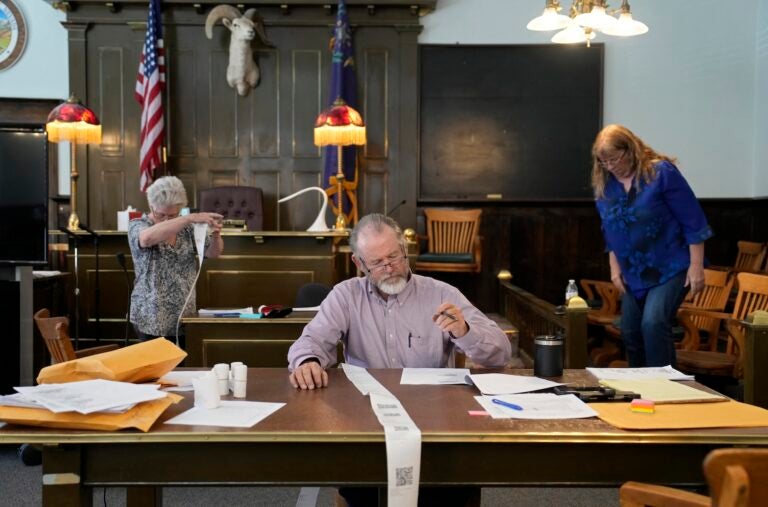Election conspiracy theories fueled a push to hand-count votes, but doing so is risky and slow
Research shows that hand-counting ballots is more prone to error, delays results and costs more.

FILE - Esmeralda County Commissioner Ralph Keyes, center, works on a hand recount of votes with others, June 24, 2022, in Goldfield, Nev. (AP Photo/John Locher, File)
Four years of Donald Trump’s false claims about a stolen 2020 election have kindled growing suspicion of voting machines among conspiracy theorists. One of their solutions is to replace the tabulators that count every vote with people who will do that by hand.
Controversies over the issue have flared periodically in pockets of the country before the 2024 presidential election even though research has shown that hand-counting is more prone to error, costlier and likely to delay results.
The few counties that have attempted the massive task have found the process more time-consuming, expensive and inaccurate than expected.
In Texas’ Gillespie County, a hand-count of Republican primary election ballots this year stretched into the early morning hours, taking almost 24 consecutive hours with 200 people counting ballots, the Texas Tribune and VoteBeat reported. The hand-count cost taxpayers about double the wage costs of the 2020 Republican primary and involved fixing a series of errors, the news nonprofits reported.
In rural Nye County in Nevada, where volunteers in 2022 embarked on an unprecedented full hand-count of midterm votes, mismatched tallies led to recount after recount. After the first day of counting, the county clerk, Mark Kampf, estimated a discrepancy of nearly 25% between the hand and machine count, attributing it to human counting error. The painstakingly slow process was halted by the state’s Supreme Court over concerns that early vote tallies could be leaked publicly.
Shasta County, a conservative rural county in northern California, last year abandoned plans to hand-count ballots after the plan was estimated to cost $1.6 million and require more than 1,200 additional employees.
Still, some jurisdictions continue to call for hand-counting.
Most recently, Georgia’s State Election Board voted to require poll workers to count the number of paper ballots, but not the votes, by hand after voting is completed. The counting would have to be done by three separate poll workers until all three counts are the same.
The new rule went against the advice of the state attorney general, the secretary of state and an association of county election officials.
Explaining the election
- Counting the ballots: Want to follow election results like a pro? Here’s what to watch in key states
- Voter fraud: Yes, it happens. But it’s rare, and election offices have safeguards to catch it
- Calling races: If the polls just closed, how can AP already declare a winner? Here’s what to know
- The media’s role: News media don’t run elections. Here’s why they call the winners
A ‘grassroots’ movement
Efforts to replace modern voting machines with more laborious, error-prone hand-counting are rooted in a set of conspiracy theories about voting machines that have been spread by Trump and his allies. Some Republicans, inspired by election lies claiming that widespread fraud cost Trump reelection in 2020, have pushed for hand-counting ballots and banning the electronic tabulators used to scan ballots and record votes, despite no evidence of widespread fraud or major irregularities.
“This movement could have died if it had just been a flash in the pan from the 2020 election,” said Charles Stewart, a political science professor at Massachusetts Institute of Technology. But conspiracy theorists such as election denier and MyPillow founder Mike Lindell have traveled the country working “to create a grassroots social movement around this skepticism,” Stewart said.
While these conspiracy theories are not common nationwide, they have found a stubborn hold in pockets of the country, “primarily in the deepest red parts of the deepest red states,” Stewart said.
Problems with cost, speed and accuracy
The hand-counting of ballots threatens to delay results by days, weeks or even months, depending on jurisdiction and staffing. Swapping machines with hand-counts would not only be slower but also increase the chances for mistakes and fraud, research has shown.
In a New Hampshire study, poll workers who counted ballots by hand were off by 8%, compared with a 0.5% error rate for machine counting.
“Human beings are really bad at tedious things, and counting ballots is among the most tedious things we could do,” Stewart said. “Computers are very good at tedious things. They can count very quickly and very accurately.”
Paper ballots already used
Trump and other Republicans have called for the use of paper ballots in this year’s election. In fact, paper ballots or paper records of every vote already are produced in nearly every state.
The Brennan Center at New York University estimates that 98% of all votes nationwide will be cast on paper in this year’s presidential election.
Paper ballots also are used in postelection, hand-count audits to identify any irregularities with ballot scanning and counting and to ensure the machine results are accurate. Election officials also conduct accuracy testing on the machines before every election.
Susannah Goodman, director of election security at Common Cause, said informing voters of the checks already in place can help reduce the fear and distrust at the center of calls for hand-counting ballots.
“If you show voters the process and all of the steps that are taken to ensure the outcome is correct – not just tell, show – they gain confidence,” she said.
WHYY is your source for fact-based, in-depth journalism and information. As a nonprofit organization, we rely on financial support from readers like you. Please give today.





